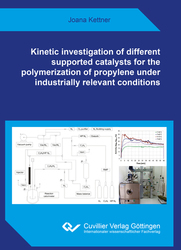| Departments | |
|---|---|
| Book Series (97) |
1383
|
| Nachhaltigkeit |
3
|
| Gesundheitswesen |
1
|
| Humanities |
2379
|
| Natural Sciences |
5409
|
| Mathematics | 228 |
| Informatics | 320 |
| Physics | 980 |
| Chemistry | 1365 |
| Geosciences | 131 |
| Human medicine | 243 |
| Stomatology | 10 |
| Veterinary medicine | 108 |
| Pharmacy | 147 |
| Biology | 835 |
| Biochemistry, molecular biology, gene technology | 121 |
| Biophysics | 25 |
| Domestic and nutritional science | 45 |
| Agricultural science | 1005 |
| Forest science | 201 |
| Horticultural science | 20 |
| Environmental research, ecology and landscape conservation | 148 |
| Engineering |
1799
|
| Common |
97
|
|
Leitlinien Unfallchirurgie
5. Auflage bestellen |
|
Advanced Search
Kinetic investigation of different supported catalysts for the polymerization of propylene under industrially relevant conditions (English shop)
Joana Kettner (Author)Preview
Extract, PDF (1.1 MB)
Table of Contents, PDF (600 KB)
Scope of the work is the kinetic investigation of two fourth generation Ziegler-Natta catalysts as well as a supported metallocene catalyst for the polymerization of propylene under industrially relevant conditions and the development of simplified phenomenological kinetic models describing the polymerizations. Therein, the influence of different reaction conditions (temperature, pressure, hydrogen concentration) and, in particular, the effect of prepolymerization on catalyst kinetics as well as on polymer characteristics are studied. The Ziegler-Natta catalysts were investigated under gas-phase conditions in a 5 l horizontal stirred tank reactor operating in semi-batch mode. Both catalysts showed a similar kinetic behavior as well as hydrogen response at the different reaction conditions. Applying a prepolymerization led to an increase in activity at higher reaction temperatures as well as an improved polymer morphology. The impact of prepolymerization is catalyst specific and depends on the catalyst activity reached at main polymerization temperature. The supported metallocene catalyst was studied under bulk conditions in liquid propylene using a special 250 ml reaction calorimeter. A focus was set on procedure development (in-situ and external prepolymerization) with the target of defined prepolymerization conditions and early access to the kinetic profile. Final kinetic measurements were carried out using the developed external prepolymerization procedure. Based on the experimental studies, simplified phenomenological kinetic models are developed for each catalyst type enabling the quantitative description of the polymerization reactions at the different reaction conditions including the effect of prepolymerization. Main hypothesis for the mathematical description of the prepolymerization effect is that particle overheating at the beginning of the polymerization is the major reason for lower activities obtained when no prepolymerization is applied. For particle modeling, a quasi-homogeneous particle model is assumed considering particle growth and particle heat-transfer. As similar kinetic behaviors were observed for both Ziegler-Natta catalysts, the same kinetic model can be used; differences can only be described by the catalyst specific amount of polymerization active component. A similar kinetic model approach is used to describe the bulk polymerization with metallocene catalyst. Differences regarding the different polymerization regime, in particular monomer concentration in the polymer particle, hydrogen concentration in liquid phase, are considered. With the estimated sets of kinetic parameters, average activities and average molecular weights can be calculated as well as activity profiles of the catalysts can be quantitatively described at the different reaction conditions.
| ISBN-13 (Hard Copy) | 9783736970038 |
| ISBN-13 (eBook) | 9783736960039 |
| Final Book Format | A5 |
| Language | English |
| Page Number | 176 |
| Lamination of Cover | matt |
| Edition | 1. |
| Publication Place | Göttingen |
| Place of Dissertation | Halle-Wittenberg |
| Publication Date | 2019-05-14 |
| General Categorization | Dissertation |
| Departments |
Chemistry
|
| Keywords | Propylene polymerization, Ziegler-Natta catalyst, metallocene catalyst, gas-phase, bulk, kinetic measurements, reaction calorimetry, kinetic modeling |








